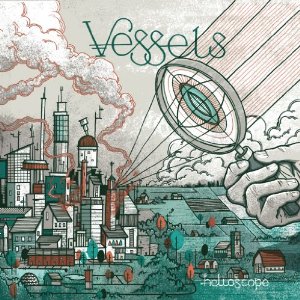For a group whose polyrhythmic math-cum-post-rock shapes were delivered with such bombast, the fanfare that greeted Vessels’ debut album White Fields & Open Devices was rather more muted, despite a strong critical reaction. Maybe it was the timing; in 2008 listeners had been listening to various takes on the Mogwai/Godspeed! build the emotion block-by-block blueprint for around a decade, with few successors managing to do little more than imitate. Those that did offer something different found themselves met with a weary ear, and so it is that the likes of 65daysofstatic and I Like Trains – among those tenuously bracketed together during the mid noughties – now survive having almost completely re-invented themselves, while the likes of Redjetson and Yndi Halda haven’t been heard from for a long time.
Helioscope demonstrates that Vessels too have their perspectives very much trained on re-evaluation, though in truth their debut always promised as much, its more pedestrian ascents often shattered with vein-bulging tempestuous ferocity, while other inclusions gave clear evidence of a group not interested in fitting any sort of hackneyed “post-rock” mould. For one, those vocals that appeared somewhat shakily on the likes of ‘A Hundred Times In Every Direction’ and ‘Yuki;’ they still remain this time round and have been given more focus so that songs such as ‘Recur’ are enhanced rather than diminished by their addition – and that’s not even counting the stellar vocal contribution from guest vocalist Stuart Warwick on the sensually panoramic ‘Meatman, Piano Tuner, Prostitute’, his bleeding swoon possessing the sort of stop-at-five-paces affectation as a Jeff Buckley or Thom Yorke.
Other things have been built on as well in the intervening years; noted as a considerable strength last time out, Tim Mitchell’s drumming has been ushered further into the limelight, his dextrous patterns now far more chief catalyst than mere backbone, positively dragging opening pair ‘Monoform’ and ‘The Trap’ through their bars with controlled time-signature fluctuating ruthlessness. It’s only on ‘Meatman…’s ‘ sombre balladry that the others catch up with him, and only on ‘Art/Choke’ when they finally submerge him, the stick man having to yield to reinforced guitars that hammer down on the percussion with a desperate defiance. Those guitars themselves though echo the drumming’s streamlined conciseness; gone for the most are the heavily echoed washes of noise that purveyed over any album that didn’t have a song included clocking under six minutes long between 2003 and 2008. Replacing them are slick, jagged incisions that rattle around tracks with a buoyant groove; far from any sort of ambient instrumental wanderers, Vessels are now giving the impression of a band who, like Battles, want to make you dance – albeit it via putting any would-be floor filler through a rigorous lab of sonic tests and experiments first. All of these added nuances and tweaks by themselves don’t count for much, but together they propel Helioscope onto a truly impressive level.
Which makes it all the more nonsensical that the best track on here is one that remains steeped in post-rock familiarity; on paper ‘All Our Ends’ – book ended by the skeleton-less drones of ‘Heal’ and ‘Spun Infinite’ – shouldn’t be anything above the ordinary. Acoustic guitars and vocals lead through the opening three minutes, layers gradually being added then falling away, before a glottal stop of sorts heralds an onrushing onslaught of siren guitars, repeating in greater and greater volume. The whole thing comes crashing to a halt some seven and a half minutes in; it’s exploitation of a loud/quiet/loud dynamic at its most obvious and yet maybe it’s because of such comparative simplicity that it works so well – the challenge for instrumental music is always to imbibe the requisite emotion that would be found in lyrics, and on ‘All Our Ends’ Vessels display that they have that oft feigned but rarely acquired intangible knack. At 3:40 that sudden surge of glorious noise drives against the heart strings as powerfully as any overwrought couplet, the ensuing power reaching to ever more euphoric plains thereafter.
It effectively brings and end to an album that acts as a shot in the arm to guitar-based instrumental music, an album of life and charm, one that’s not afraid to put the human voice in amongst its array of aural dexterities and one that’s capable of subtle majesty at one point and brutal velocity at another. Three years ago Vessels might’ve felt that they’d arrived as their peers last embers were dying out; in 2011 they look set to be the ones that rekindle the flames.


